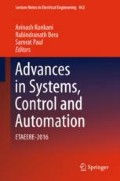Abstract
Conventionally, mathematical calculations based on formulas are required to model and design any converter for software or hardware implementation. However, in this chapter, an alternative method has been suggested to replace the conventional method of formula-based mathematical calculations by developing a hybrid model known as adaptive neuro-fuzzy inference system (ANFIS). It is a hybrid system which combines two most important methodologies of soft computation namely artificial neural network and fuzzy logic. It has been used as the tool in MATLAB platform to determine the design parameters of Boost and Buck–Boost converters. The alternative suggested in this chapter also focuses on reduction of computational time and susceptibility toward human error in mathematical calculation.
References
Jafari, M., Imanieh, M., Malekjamshidi, Z.: Design, simulation and implementation of a full bridge series-parallel resonant DC–DC converter using ANN controller. In: Control and Communications, International Siberian Conference on Control and Communications SIBCON. pp. 97–103 (2011)
Rajarajeswari, N., Thanushkodi, K.: Design of an intelligent bidirectional DC–DC Converter with half bridge topology. Eur. J. Sci. Res. 22, 90–95 (2008)
Bhat, S., Nagaraja, H.N.: Effect of parasitic elements on the performance of buck-boost converter for PV systems. Int. J. Electr. Comput. Eng. 4 (2014)
Jeong, G.J., Kim, I.H., Son, Y.I.: Design of an adaptive output feedback controller for a DC/DC boost converter subject to load variations. Int. J. Innov. Comput Inf. Control. 7, 791–803 (2011)
Lozano, C.A.: State variable model for considering the parasitic inductor resistance on the open loop performance of DC–DC converter. J. Comput. Commun. 2, 41–48 (2014)
Sathya, P., Natarajan, R.: Design and implementation of 12 V/24 V closed loop boost converter for solar powered LED lightning system. Int. J. Eng. Technol. 5, 254–264 (2013)
Jang, J.S.R.: ANFIS: adaptive-network-based fuzzy inference system. IEEE Trans. Syst. Man Cybern. 23, 665–685 (1993)
Al-Hmouz, A., Shen, J., Al-Hmouz, R., Yan, J.: Modeling and simulation of an adaptive neuro-fuzzy inference system (ANFIS) for mobile learning. IEEE Trans. Learn. Technol. 05(3), 226–237 (2012)
Roy, S.S.: Design of adaptive neuro fuzzy inference system for predicting surface roughness in turning operation. J. Sci. Ind. Res. 64, 653–659 (2005)
Sarikaya, N., Guney, K., Yildiz, C.: Adaptive neuro fuzzy inference system for the computation of the characteristic impedance and the effective permittivity of the micro-coplanar strip line. Prog Electromagnet. Res. B 6, 225–237 (2008)
Pathak, S.S., Sood, H., Sharma, S., Khitoliya, R.K.: Prediction of compressive strength of self compacting concrete with flyash and rice husk ash using adaptive neuro fuzzy inference system. Int. J. Adv. Comput. Sci. Appl. 3, 119 (2012)
Mohdeb, N., Hacib, T.: A new application of an adaptive neuro fuzzy inference system for the shape optimal design of electromagnetic devices. Int. J. Intell. Syst. Appl. 6, 11–19 (2012)
Martinek, R., Kelnar, M., Vanys, J., Bilik, P., Zidek, J.: A robust approach for acoustic noise suppression in speech using adaptive neuro fuzzy inference system. J. Electr. Eng. 66, 301–310 (2015)
Yeh, J.-P., Yang, R.-P.: Application of the adaptive neuro fuzzy inference system for optimal design of reinforced concrete beams. J. Intell. Learn. Syst. Appl. 6, 162–175 (2014)
Kharb, R.K., Fahim Ansari, M.D., Shimi, S.L.: Design and implementation of ANFIS based MPPT scheme with open loop boost converter for solar PV module. Int. J. Adv. Res. Electr. Electron. Instrum. Eng. 3 (2014)
Walia, N., Singh, H.: ANFIS: adaptive neuro fuzzy inference system, a survey. Int. J. Comput. Appl. 123 (2015)
Author information
Authors and Affiliations
Corresponding author
Editor information
Editors and Affiliations
Rights and permissions
Copyright information
© 2018 Springer Nature Singapore Pte Ltd.
About this chapter
Cite this chapter
Ipsita Das, Moumi Pandit (2018). A Comparative Analysis of Determination of Design Parameters of Boost and Buck–Boost Converters Using Artificial Intelligence. In: Konkani, A., Bera, R., Paul, S. (eds) Advances in Systems, Control and Automation. Lecture Notes in Electrical Engineering, vol 442. Springer, Singapore. https://doi.org/10.1007/978-981-10-4762-6_11
Download citation
DOI: https://doi.org/10.1007/978-981-10-4762-6_11
Published:
Publisher Name: Springer, Singapore
Print ISBN: 978-981-10-4761-9
Online ISBN: 978-981-10-4762-6
eBook Packages: EngineeringEngineering (R0)

